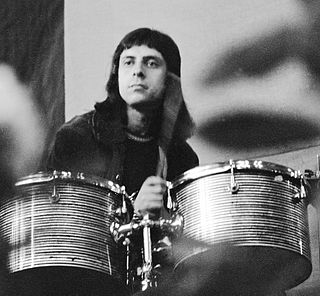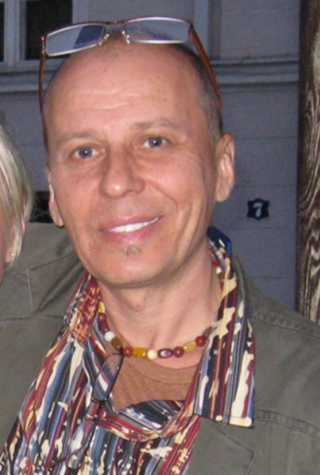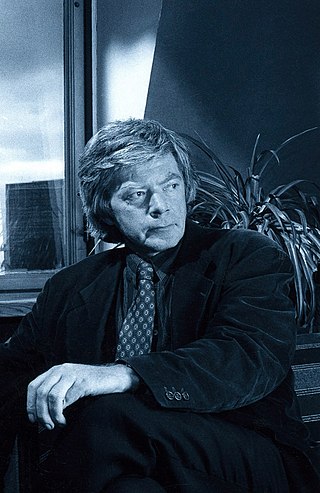Related Research Articles
The Estonian rock music scene saw its beginnings in the mid-1960s during Khrushchev Thaw in the Soviet Union and the rise of British bands all over the world. The first Estonian rock-groups were primarily high school bands playing cover versions of the current UK Top 10. Despite the lack of official support from Soviet authorities some of these groups, posing as dance music bands in various clubs, gained a large underground following. Some groups managed to make proper studio recordings and appear a couple of times on television.
Ruja was one of the foremost Estonian rock bands of the 1970s and 1980s. The name of the band comes from a neologism "ruja", for science fiction, though there are people who believe that "ruja" is actually made up of the first letters of the band's important members. The band released their first and self-titled album in 1979. Many of the original melodies of Ruja were composed by Rein Rannap.

J.M.K.E. is an Estonian punk rock band, which formed in Tallinn on January 18, 1986.

Kuidas kuningas Kuu peale kippus is an album released in 2004 by No-Big-Silence and Kosmikud.

Apelsin was an Estonian band created in 1974. Their lyrics are in Estonian and Russian. During the Soviet era, their LP albums were issued by the Soviet music monopoly Melodiya. The Russian name of the band was Апельсин. In both Estonian and Russian, the band's name means orange. Many songs and much of the music of the band are satirical. The band's combining music with humor was one of the reasons the band had become one of the most popular Estonian bands of all time.

Gunnar Graps-Grāfs was a popular Estonian musician and one of the pioneers of hard rock in Estonia and the former Soviet Union. He has sold hundreds of thousands of records all over the world and in 2004 Graps was given a lifetime award at Estonian Music Awards. He has been compared to Mick Jagger and Alice Cooper, both who were his own personal idols, and is often called Raudmees.
Bedwetters are an Estonian pop punk band formed in September 2004. They became known in the spring of 2007 when they won a major contest for Estonian new groups. The band didn't play together between May 2013 and June 2022.
Urmas Alender was an Estonian singer and musician, the vocalist of popular Estonian bands Ruja and Propeller.

Prince Peeter Volkonski is an Estonian rock-musician, composer, actor, and theatre director.

The following is an alphabetical list of articles related to the Republic of Estonia.
The second season of Eesti otsib superstaari started on February 3, 2008 and lasted until June 2008. The hosts of first season were replaced by two male comedians/actors, Ott Sepp and Märt Avandi. Heidy Purga, Mihkel Raud and Rein Rannap continued as judges.

Tõnis Mägi is an Estonian singer, guitarist, composer and actor. He is one of the most influential and remarkable names in Estonian rock music of the past 40 years. More recently, he is known for his political activity in support of the right-wing populist and national-conservative Conservative People's Party of Estonia as well as vaccine hesitancy.

Vjatšeslav "Slavka" Kobrin was a Russian guitarist and songwriter.

The Princes is an Estonian rock band. The band was formed in 2009 by Edward Krimm and Jaagup Tormis, the grandson of one of the greatest living choral composers Veljo Tormis. The current lineup consists of Edward Krimm, Jaagup Tormis, Kaur Garšnek (guitar) and Valdur Viiklepp. All the members have a musical background and have taken part in other musical groups as well. Most notably, Jaagup Tormis has played in Sinine and Pedigree, Kaur Garšnek has played in Kreatiivmootor. Past members of The Princes have included Taavi Paomets, Kostja Tsõbulevski and Madis Viksi.

Kalle Vilpuu is an Estonian guitarist and songwriter. Vilpuu is best known as the guitarist for Estonian rock band Ultima Thule. He also has played guitar for Estonian bands House Of Games and Seitsmes Meel. In 2013, Vilpuu released his debut solo album Silver Lining. This album consists of 11 instrumental tracks, including the core rhythm section of Andrus Lillepea (drums) and Henno Kelp (bass). Hard rock, jazz-rock and a spacier type of 21st century progressive/soundtrack music merges on Kalle Vilpuu's Silver Lining. In 2015, Dutch radio station T-on-Air selected Silver Lining as album of the year.

The Kaitseväe orkester, known in Anglophone countries as the Band of the Estonian Defence Forces, is the official military band service of the Estonian Defence Forces. The main task of the band is to play music at all national and military ceremonies. The band's repertoire includes mostly classical and marching music. It is currently made up of 40 musicians. From 1996 to 2019, the conductor of the band was Lieutenant Colonel Peeter Saan. Each year, the band takes part in about 220 concerts, festivals, and ceremonial parades of the Defence Forces. It has also performed at venues abroad in countries like Lithuania, France and Germany. Traditionally, the band holds Autumn and Spring concerts in the Estonia Concert Hall.
Kaur Alttoa is an Estonian art historian and cultural historian.
In Spe was an Estonian progressive rock band established in 1979 by Erkki-Sven Tüür.
Estonian punk is a punk movement in Estonia, part of the international punk subculture.

Mati Sirkel is an Estonian translator and writer.
References
- 1 2 Volt, Meisi (7 March 2014). "Propeller tähistab 35. sünnipäeva rajult punkides". Postimees (in Estonian). Retrieved 25 February 2019.
- ↑ "Rock, Roll and Revolt". Washington Post. 4 February 1990. Retrieved 25 February 2019.
- ↑ Green Jr., James (2017). Brave Punk World: The International Rock Underground from Alerta Roja to Z-Off (First ed.). Lanham, Maryland, United States: Rowman & Littlefield Publishers. pp. 67–68. ISBN 978-1442269842.